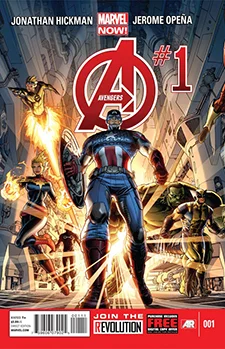Hello, folks. I've asked Jacob Hall to come up with a regular feature, and this is it, in its inaugural form - The Trophy Room. Jacob is a writer for Screencrush.com and Movies.com, and a lover of storytelling in all of its forms. With The Trophy Room, he'll give weekly awards to the comics that he thinks stand out.
Welcome to the Trophy Room, where I'll recap my week in comics through arbitrary awards. Everyone's a winner! Unless you're a loser. And then you're probably not a winner. Sorry.
Hickman-iest Comic of the Week: New Avengers #2
The second issue of New Avengers has everything you'd expect from a comic penned by Jonathan Hickman: a few dramatically blank (wasted) pages, lots and lots of dialogue that's bound to pay off three times over in twenty issues and a villainous scheme so complex that it literally requires Mr. Fantastic to pull a Doc Brown and draw a diagram to explain it to the rest of the Illuminati (and the reader). This book certainly isn't going to win over Hickman's detractors, but if you like your superhero stories decompressed and filled with all kinds of nutty hard science fiction, well…then you really should be reading New Avengers.
Least Hickman-iest Comic of the Week: Savage Wolverine #1
On the opposite end of the spectrum from New Avengers, you'll find writer/artist Frank Cho's Savage Wolverine, which manages to squeeze a ridiculous amount of action and momentum into its debut issue. I'm not enough of a Wolverine fan to pick up issue two (I hugely prefer Jason Aaron's silly take on the character over the every-popular growling badass), but this is a perfectly fine book that's going to please fans of the character and satisfy those who hungering to see Wolverine snikt his way through legions of baddies.
Best Use of a Talking Cat: Saga #9
What's up with talking cats becoming the break-out characters in my favorite books? Socks, the Animal Totem turned house cat over in Jeff Lemire's Animal Man, is somehow one of the best characters currently inhabiting the DC universe, but he's got stiff competition in this category from Lying Cat over in Image's Saga. The sidekick/companion of the mercenary known as The Will, Lying Cat is able to detect whenever a character is lying, no matter how petty the mis-truth. It's no exaggeration to say that I laugh out loud each and every time Lying Cat makes an appearance, so I was more than happy to spend an issue away from the series' protagonists and get to know The Will and his world a little better. This issue doesn't get the Comic of the Week award only because this series would win that honor every time it comes out and that's just not fair.
Best Horror Comic Disguised as a Batman Comic: Batman #16
There are parts of me that are deeply uncomfortable with Scott Snyder's Batman, mainly because I can't help but imagine an eight-year-old Batfan picking up an issue and being traumatized for life. But I'll just have to get over that because Snyder and artist Greg Capullo have turned Batman into one helluva horror comic, albeit one starring the Caped Crusader. Although the "Death of the Family" arc has been consistently unsettling, issue #16 is a special brand of grotesque, following Batman as he navigates an Arkham Asylum that's been completely taken over by the Joker. Readers looking for more friendly Batman adventures should check out John Layman's exceptional Detective Comics - Snyder's is a comic for grown-ups with strong stomachs.
Most Confounding Final Issue For a Series That's Been Unceremoniously Cancelled: Frankenstein: Agent of S.H.A.D.E. #16
Despite being one of the most consistently entertaining titles on the stands, Frankenstein: Agent of S.H.A.D.E. is no more and its final issue is baffling, to say the very least. That doesn't mean it's bad, per se, it just means that it ignores everything that went down in the past couple of issues, leaps backwards in time, revives a bunch of dead characters and tells a story set prior to the events of the "Rotworld" crossover event. I get why this happened - it lets the series end with our titular hero and his Creature Commandos triumphant - but it feels wrong, especially since the whole "Rotworld" thing is still ongoing over in Swamp Thing and Animal Man, leaving Frankenstein's side of the tale feeling woefully incomplete. This is a perfectly entertaining issue, but there's something quietly insulting about it. Instead of an actual ending, this final issue promises future adventures…which we'll never get. Because the series is canceled. Delightful.
Runner-Up Comic of the Week: Daredevil #22
Fact: there is no superhero book on the stands better than Daredevil. Mark Waid and Chris Samnee continue to tell the ever-pitch dark story of Matt Murdoch without wallowing in grime, walking the finest of fine lines between fun and morbid. Daredevil is telling a story about damaged people at the end of their ropes, but it's still, somehow, an absolute joy and pleasure to read. Bonus points for Waid's take on the Superior Spider-man, which made me realize that character is going to be genuinely hilarious as he navigates the dense Marvel Universe.
Comic of the Week: Captain Marvel #9
For its first eight issues, Kelly Sue DeConnick's Captain Marvel has been a consistently entertaining series with a solid grasp on its characters and fun (if not especially memorable) conflicts. Well, something went wonderfully right with issue #9 and the result isn't just good: it's Matt Fraction's Hawkeye and Waid's Daredevil good. Instead of sending Carol Danvers on another journey through time and having her fight another giant robot, DeConnick sends the former Ms. Marvel on her most interesting adventure to date: a very, very busy day in New York City (drawn by Filipe Andrade, whose anime-influenced pencils are stunning). By keeping her on the streets instead of in the cosmos, DeConnick grounds Danvers and her conflicts, making scenes like a battle with two time-displaced dinosaurs somehow relatable (because it's going to make her late for her cat's vet appointment, you see). I don't know if this signals a major shift in the book's tone or if it's just a one-off, but consider me a big fan of this (pardon the pun) grounded Captain Marvel.










